Exploring the establishment of party offices: UML, Nepali Congress, Maoist Center, RSP, and RPP
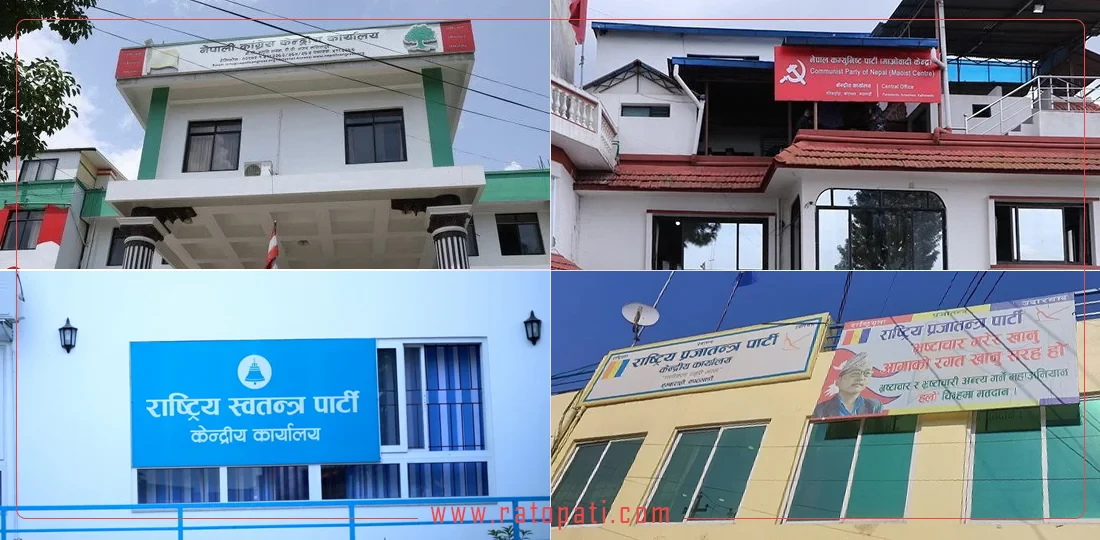
Kathmandu, October 15 — Following the news that businessman Min Bahadur Gurung has donated land for the CPN-UML party office, there has been significant discussion and debate about it. Amidst the backdrop of thousands of people being displaced by floods and landslides, the donation of land for the UML party office by the leading party's businessman and his announcement to construct the building himself has sparked arguments both in favor of and against the decision.
As questions arise about the UML, there is also interest in how and where the party offices of other parties, such as the Nepali Congress, Maoist Center, Rashtriya Swotantra Party (RSP), and Rashtriya Prajatantra Party (RPP), have been established. In this context, Ratopati has presented a report on the party offices of these four parties.
Kishunji purchased land for Nepali Congress
The central office of the Nepali Congress, the largest party in Parliament, has been located in Sanepa, Lalitpur, for a long time. During the tenure of then-Congress leader Krishna Prasad Bhattarai, the party bought land and built its central office there, leading to the relocation of the Congress party office from Teku to Sanepa in 2063 (2006 AD).
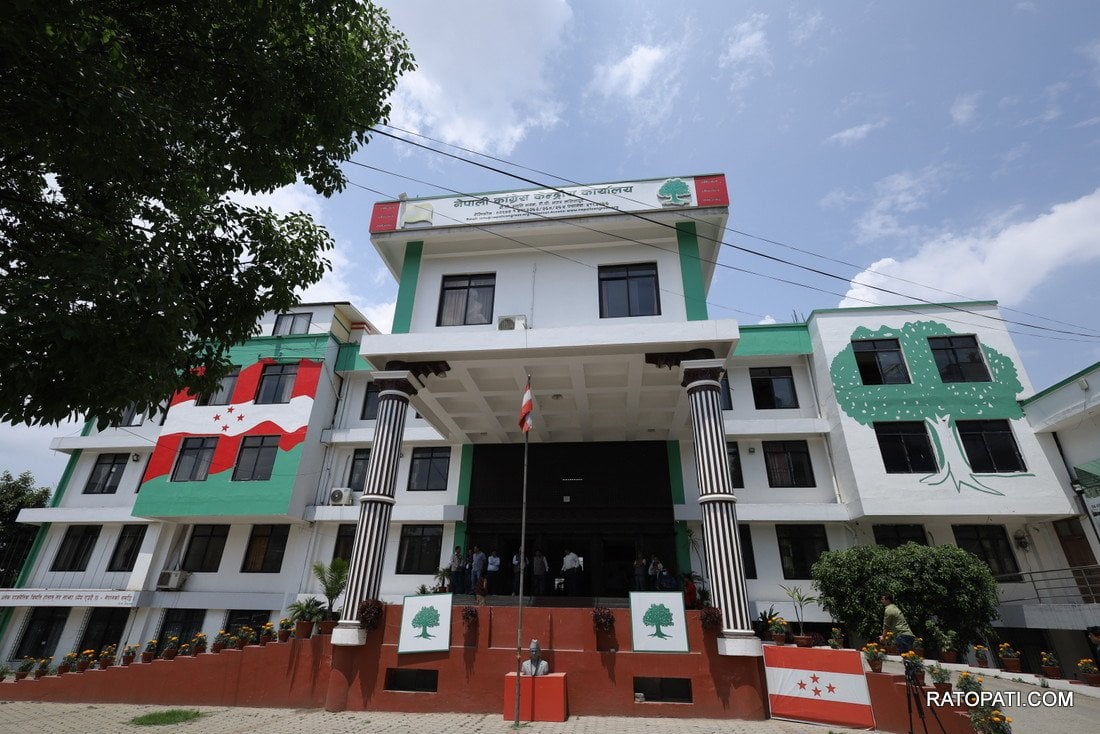
“We moved from Teku to Sanepa after the party built its own office over three to four years,” said Congress leader Shobakar Parajuli. “Initially, we raised funds from party leaders and workers to purchase the land in Kishunji's name, and later, it was transferred to the party’s name.”
According to Congress leaders, the land on which the party office is situated spans more than seven ropanis.
Maoists also have their own party office
After entering the peace process in 2062/63, the then-Nepal Communist Party (Maoist) was searching for a place to establish its central office. The Maoist labor organization, the All Nepal Trade Union Federation, learned that there was vacant land in Koteshwar’s Parisdanda.
Upon receiving this information, the federation's leaders, including Shiva Kattel, visited Parisdanda to inspect the property. They discovered that the land and building now housing the central office belonged to Bhim Bahadur Dhakhwa, who was preparing to operate a hotel named Paris. However, despite completing the hotel, there were issues due to lack of access roads. He was trying to run the hotel after taking a loan from the Rashtriya Banijya Bank.
After being unable to operate the hotel for a long time, the bank announced the property for auction. Meanwhile, the area was turning into a hotspot for drug addiction, causing distress among local residents. As the situation worsened, the Maoists purchased the property after the bank released the collateral of the indebted owner, Kattel, who is now the coordinator of the Maoists in Lalitpur, claimed.
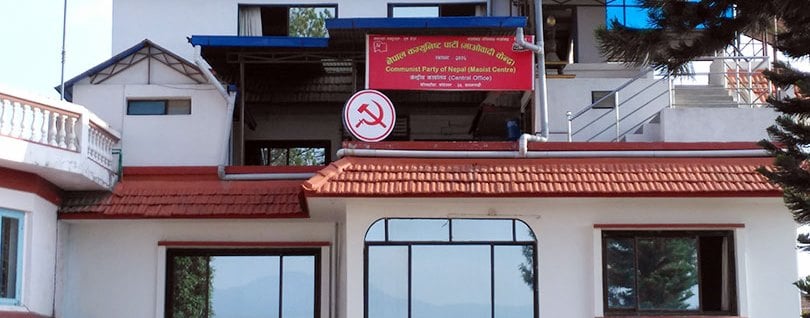
The property is registered in the name of the Trade Union Federation, Kattel informed. He stated that the land, which includes the area where the canteen operates, is now in the party's name. According to him, the land for the central office spans 2 ropanis and 8 aanas, with an additional 5 ropanis located on either side of the road leading to the central office, at 20 aanas each.
“The Maoist party office was purchased by the party. At that time, the landowner was in a difficult situation. Bhim Bahadur Dhakhwa had put the property as collateral in the bank. Unable to repay the loan, it was put up for auction. Many of his businesses were failing. We cleared the bank's debt and got him removed from the black list,” he said. “We didn’t use any unethical means. The purchase was made in a manner acceptable to the debtor, the bank, and the Maoists. We paid the bank’s money, and the remaining amount was given to the debtor. After that, the party office was established. The building housing the central office remains unchanged; nothing has been modified.”
Kattel claimed that they had paid the bank 20 million for the land inside the gate and the remaining 7.4 million was given to the debtor. He also mentioned that the remaining 40 aanas outside the gate were purchased from various individuals over different periods.
“We bought the 12 aanas with the canteen for 13.8 million. The land above the road was acquired for 25 million. The remaining 8 aanas were bought from a person with the surname Katuwal just two years ago. The reasons for the debtor's internal issues were unknown. In my view, the lack of access roads caused the debtor to fail in running the hotel. Only after purchasing the land did we create a path from the middle to access the office. There was no road there before,” Kattel explained about the state of the land.
Shreeram Dhakal, the chief secretary and treasurer of the central office, claimed there was no dispute as the party had purchased the land from various individuals.
“The land for the central office is in the name of the Trade Union Federation, which acquired it in 2066 BS. The land outside the compound was purchased by the party at different times from individuals, including the 12 aanas with the canteen from Shiva Kattel. The 8 annas purchased earlier were from someone with the surname Katuwal. There are 6 plots above the road and 2 plots below. We bought from Kattel in 2069 BS. The purchase from Katuwal was only two years ago,” Dhakal said.
While the purchase from Kutuwal was made for 50 million, he noted that he wasn't certain about the other land acquisitions. Dhakal mentioned that detailed information could only be provided by reviewing the office records.
RSP office in a party leader's rental home
The office of the fourth largest party in Parliament, the Rashtriya Swotantra Party (RSP), operates from a rented house.
After its formation, RSP rented the house of Bharatmani Devkota, who is also a leader of the party, located in Bansbari, to use as its office.
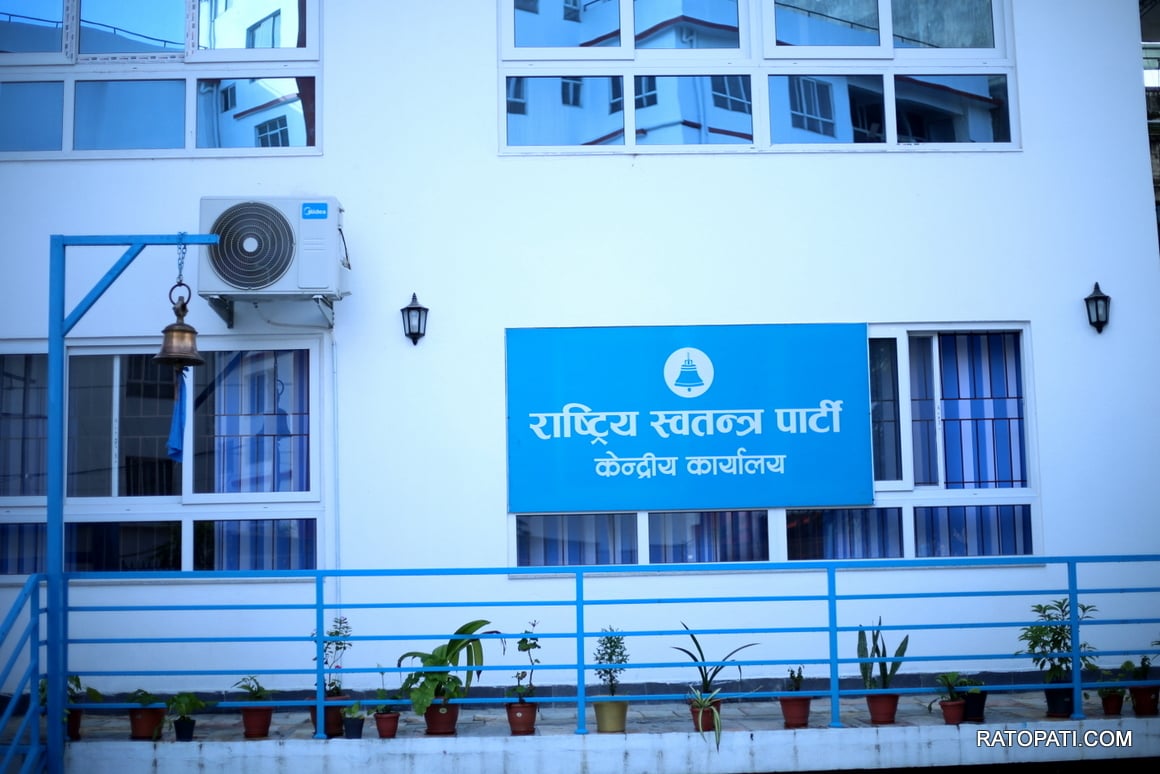
The party's financial audit shows that it spent 2,924,850 for rent in the fiscal year 2079/80 and 4,620,000 in the fiscal year 2080/81.
Although the house where RSP operates its office belongs to Bharatmani Devkota, the head of the party's central disciplinary commission, party leaders say they pay a monthly rent of 350,000 to run the office.
“We have been operating the party office in Bansbari by paying monthly rent,” central member Ganesh Karki told Ratopati. “We haven't taken the whole house; we are renting half of it. Moreover, we are not allowed to use the second floor where the party office is located.”
RPP offices built on donations
The fifth largest party in Parliament, the Rastriya Prajatantra Party (RPP), has two party offices. Located in Dhumbarahi and Chabahil Charumati, these offices were built through donations.
In 2063, Pashupati Shamsher Rana bought a house in Chabahil for the party. At that time, Rana, who was also the chairman of the RPP, purchased the house and transferred it to the party’s name. After the people's movement, Kamal Thapa split from the RPP to form RPP Nepal, and in 2070, a party office was established on land donated by Dil Bikas Rajbhandari, a leader of RPP Nepal and a businessman.
Later, after a merger between RPP and RPP Nepal, both party offices have been operated by the RPP, now led by Chairman Rajendra Lingden.
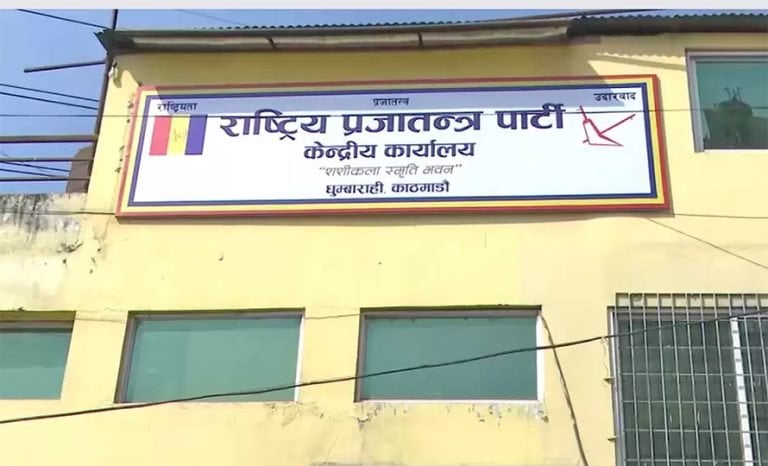
After the RPP's unification and subsequent general convention, Kamal Thapa left the party and has been leading RPP Nepal, but he has not received the Dhumbarahi office. Currently, he is conducting party activities through a rented office in Handigaun.
According to RPP leader Janakraj Pathak, while there are two offices for the RPP, most of the main activities are conducted from the building on the land donated by Dil Bikash Rajbhandari in Dhumbarahi. The office in Chabahil houses the party's various departments. The inscription on the Chabahil office states that it was built with a donation from Rana and his wife, Usha Rajya Lakshmi.
Similarly, for the office built in Dhumbarahi, Dil Bikash Rajbhandari transferred 8 aanas of land to Kamal Thapa on 23rd Chaitra 2070. However, this land has not yet been registered in the party's name. There have been disputes regarding the land, which is registered in the names of Prabha Chapagain and Kalyani Rajbhandari, as it has a high-tension line running above it, and the RPP office is located beneath it.
Rajbhandari recalls being influenced by Kamal Thapa's nationalist image at that time when he donated the land. However, he is no longer with Thapa and, although he is currently the vice-chairman in Rajendra Lingden's party, he does not seem particularly active. He expresses a desire to see a united and strong nationalist force, but he notes that factionalism has increased, making it difficult to pass the land to the party. Thapa had promised to make him an MP to secure the land, but Rajbhandari has expressed his disappointment over being deceived. He mentions that Lingden also gave similar assurances but feels he has been misled again. According to Rajbhandari, he spent 25.9 million on constructing the building on the donated land, but Thapa had previously raised a significant amount from party leaders and workers for building the party office.


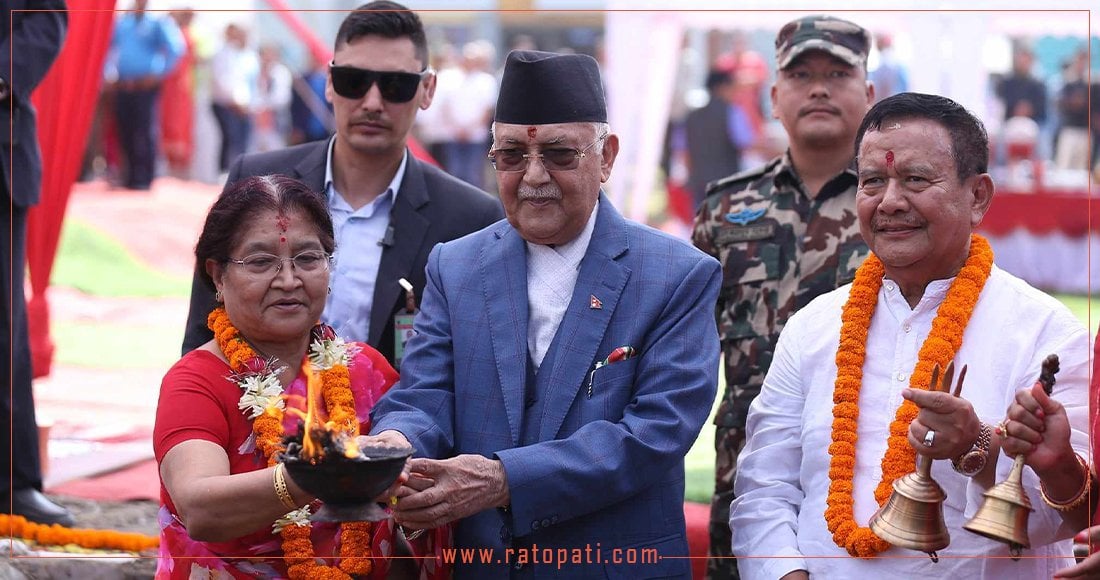








Leave Comment